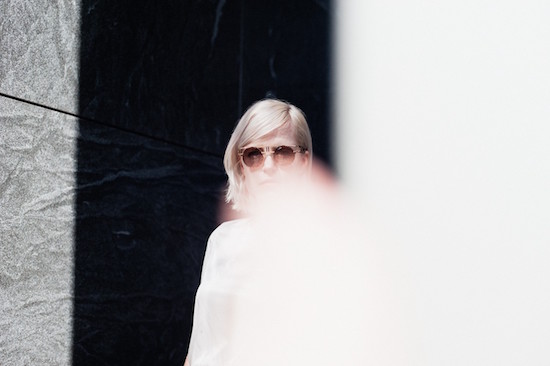Photograph courtesy of Nick Helderman
Before the Quietus interrupts her, Annelotte de Graaf, the 27-year-old behind Amber Arcades, is house-hunting. Based out of the Kanaleneiland district of her native Utrecht, she and the other members of the Eiland8 creative collective of whom she’s been a part for the last few years are facing eviction next month.
As one of the Netherlands’ 40 ‘problem neighbourhoods’ singled out for urgent attention by the Dutch ministry of housing, the city’s creative types were lured by cheap rent to occupy flats marked for demolition. "I kind of have mixed feelings about it," the singer-songwriter says. "I shouldn’t complain because I was able to live here for four or five years and not pay too much rent, but on the other hand they used the creative energy that was here. This is a pretty shitty neighbourhood, and [the government] really used the creative people that moved here as like a gimmick to write a nice story for the newspaper with smiling faces, and then when they build new apartments here they can sell them for more money."
In their years together the group produced two albums. "It’s a good memory of the times we had here," de Graaf recalls, "but it was made by a collective of about 20 or 30 people, which makes it kind of hard to listen to as a record. There’s bluesy songs and electronic stuff, which is nice, but it’s more like a collection of songs which are completely different."
She looks back on the project’s flaws with good-natured nostalgia, but shoulders her own work as Amber Arcades with utmost care for the minutiae. "Writing songs is very much a solitary process, I don’t really need a lot of people around me for that," she says when I ask if she’ll seek out another collective once Eiland8 comes to an end. "I’m kind of a control freak, I like to make all the creative decisions."
De Graaf’s New Year’s resolution, for example, is to learn keys, the first step on a long-term mission to make a record where she plays every instrument herself. Similarly, when seeking a producer for her forthcoming debut album she made her approaches with meticulous precaution. Poring through the production credits for her favourite records on the AllMusic database and compiling a shortlist of potential candidates. "I talked to all of them about their ideas for the record, where they could see it going, and also what kind of producer they were. Some were less keen on being involved in the creative process and wanted to be like a sideline figure."
Eventually she landed on producer Ben Greenberg, whose prior work with the ear-shattering likes of The Men and Destruction Unit might feel an unusual fit for her bedroom-crafted, folk-tinged melodies, but de Graaf was intent on leaving her comfort zone. "I just had the best click with Ben, personally, but also I felt like he could challenge me the most. I thought it would be really interesting to work with him, someone who is used to dealing with these loud, noisy, badass bands, to see how that would end up."
The result of their recording sessions in Brooklyn last year, her debut LP Fading Lines, which is released on Heavenly Recordings this spring, bears the fruits of exploration. A joyfully firm fusion of heady Krautrock spines and elegant drifts of blurred guitar-pop, de Graaf’s vocals rest somewhere in a happy medium of Broadcast’s Trish Keenan and Mazzy Star’s Hope Sandoval, a backing band of Kevin Morby, Quilt’s Shane Butler and Keven Lareau and Real Estate’s Jackson Pollis providing beguiling back-up to her leadership on guitar. As for what might have been had she picked another set-up, "we’ll never know," she says. "I was thinking about that a lot while we were recording it, but I’m really glad I went with Ben. It would have been a totally different record. The essence of the songs is pretty poppy, so it could easily have been a really surfy and light-hearted, easy-going record."
It’s too early in her career to pin Amber Arcades with the ‘chameleon’ cliché, yet from her earliest forays, there’s a detectable desire for constant adaptation and progress underpinning her creative drive. De Graaf’s life as a performer began in earnest while on exchange in Philadelphia as part of a law degree in 2012. "My guitar wouldn’t fit in the airplane so I bought a mandolin out there," she remembers. "I could only play two chords, so it was kind of ridiculous, but I learnt a third chord and a fourth, and we started playing. I’m from Holland so it’s not really my culture, but I thought, ‘I’m in America now, I should start learning about all this stuff, the American history of music.’"
Through friends of friends she fell in with a band of bluegrass buskers, playing parks and city streets by day, barbecuing and partying by night. "They were actually more punk kids who rode bikes, they were into Against Me! and stuff like that, so we would play a lot of punk songs covered on bluegrass instruments. I don’t think we ever got to a point where we had a name. I think they’re still doing it."
Upon returning to the Netherlands de Graaf began recording her own songs for the first time, having been writing them since 2010, and was introduced to the likes of Broadcast and Suicide by her "total music nerd" friends, having grown up as a goth kid ("I only listened to electro, cyber, industrial stuff"). She took the name Amber Arcades from Dutch writer Godfried Bomans’ Grimm-esque fairytale of a woodland hermit who tells of his endless arcades of pillars, giant mirrors and infinite pearls. In reality they are trees, lakes and dewdrops, and although the unfortunate recluse is killed for his deceit, de Graaf sees the story as "symbolic, I guess, for trying to see everything in a magical way, the magic in everyday life".
Amber Arcades would almost become a full-fledged band in its own right when she found herself with a regular cast of musicians, but even at an early stage creative control was a must. "They wanted it to become more of a ‘band’ band, where everyone has creative input," she says, "but that didn’t really work out because they weren’t as committed to it as I was. When I was in the States to record my album I said I was going to play everything myself, I want to have the creative control. I don’t want to spend $12,000 and come back with a record I don’t stand behind. So I went to work with some friends there as session musicians, and now I’m back here playing with other friends. It’s really my project. Theoretically if my band members I’m playing with now couldn’t make it on tour I would just look for another band."
Along the way she signed to Heavenly Recordings, once again on her own initiative, although helped by a happy coincidence. During Utrecht’s annual Le Guess Who? festival, de Graaf rented out her sofa as part of their couch-surfing programme. "This Polish girl Karolina got in touch with me and she ended up staying every year," de Graaf recalls. "She’s been crashing my couch ever since. She was living in London and last April I went to visit her, and she had got a job at Heavenly Recordings. She said she worked at this really awesome label, so my manager sent them some tracks and Jeff Barrett [Heavenly boss] really liked them. He came to one of my shows in Amsterdam, and he was on board.
"They put out some of my favourite records from last year – DRINKS, Stealing Sheep, King Gizzard – [and] I find their history really inspiring," she says of her new label. "When I first met Jeff he came to a show in Brighton when we were touring with Natalie Prass, and he just started talking. He’s got all these stories about being there at all these historic moments in pop history.
"It just feels awesome to be working with someone who lived that history; it makes you feel connected to it. Somehow, some small part of you is part of that legacy… at least the future of it."
Amber Arcades begins a UK tour supporting Palehound tonight at Gullivers in Manchester; for full details and tickets, head here



